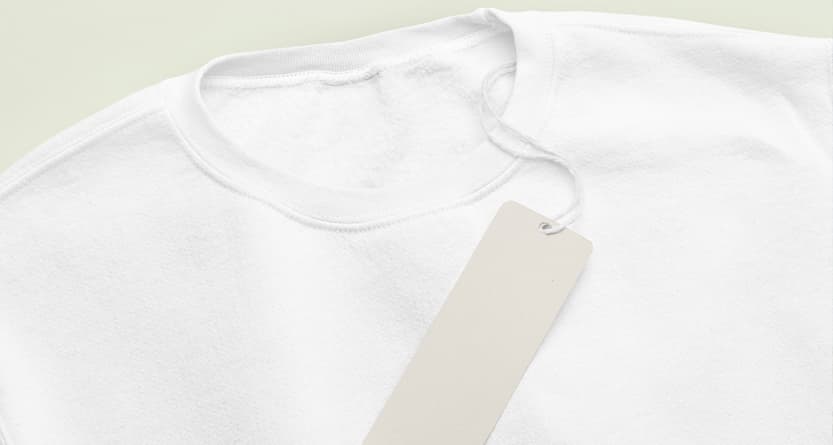Style, T Shirt Printing Australia
How to Choose T-Shirt Fabric that Suits You: Top Tips
When it comes to learning how to choose the best t-shirt fabric that suits you, understanding the various types of materials and their properties is essential. In this comprehensive guide, we will delve into the world of popular t-shirt materials and fabric tends, from cotton and polyester to sustainable options and blends.
Uncover the advantages of utilising various types of cotton in your t-shirt printing, and investigate eco-friendly options like natural cotton. We’ll look into the advantages and drawbacks of synthetic fabrics like polyester, which may be ideal for certain activities.
In addition to these popular choices, we will dive into other unique shirt fabrics that may suit your specific needs. And, we’ll examine tri-blend fabrics for those seeking softness in their apparel. Finally, an exploration of weave types and their impact on overall quality will help you make informed decisions when selecting fabric for your custom t-shirts.
By gaining a thorough understanding of these topics related to choosing t-shirt fabric that suits you best, you’ll be better equipped to create comfortable and stylish shirts made with high-quality material tailored specifically for your personal or business needs.
Table of Contents:
- Cotton T-Shirts
- Organic Cotton Apparel
- Blended Fabrics – Combining the Best Qualities
- Lightweight Comfort for Summer Wear
- Exploring Alternative T-Shirt Materials
- Weave Types – A Crucial Factor in Fabric Selection
- FAQs in Relation to How to Choose T-Shirt Fabric That Suits You
- Conclusion
Cotton T-Shirts
Cotton is the most popular choice for t-shirts due to its natural, comfortable, soft, and durable qualities. It’s an ideal fabric for everyday wear and can be used in various settings such as casual outings or office environments. The breathable nature of cotton fabric ensures that you stay cool during hot weather conditions while providing warmth when it gets colder.
Benefits of Cotton T-Shirts
- Natural Fibers: Cotton is derived from the cotton plant, making it a sustainable option compared to synthetic fibers.
- Breathable Fabric: The porous structure of cotton allows air circulation, which helps regulate body temperature and prevents sweating.
- Durable & Easy Maintenance: Cotton shirts are easy to care for; they can be washed in a washing machine without losing their shape or color over time.
- Versatility: With countless styles available, there’s always a perfect fit for everyone.
Real-Life Examples of Where Cotton Works Best
- Casual Outings: A simple yet stylish t-shirt made with quality cotton fabric is great for hanging out with friends or running errands around town.
- Sports Events & Activities: A well-designed shirt made from ring spun cotton provides comfort and durability during physical activities like sports events or gym sessions, and it has a soft feel to the fabric. Check out these popular choices at our online store: The Custom T-Shirt Shop.
In addition to regular cotton options, consider exploring other types like organic cotton, Australian cotton, and blended fabrics to find the perfect balance between comfort, durability, and sustainability. Blended fabrics are a great choice for those who want the benefits of cotton but with added features like wrinkle resistance or moisture-wicking capabilities.
Linen is another popular choice for t-shirt fabrics. It’s a lightweight and breathable fabric that’s perfect for hot weather conditions. However, it wrinkles easily and may require a lot more maintenance than cotton.
At The Custom T-Shirt Shop, we offer a variety of shirt fabrics to choose from, including quality cotton, blended fabrics, and polyester. We believe that quality fabric is essential for creating custom t-shirts that look great and are long lasting. Visit our online store to explore our range of t-shirts and apparel and create your custom t-shirt today.
Organic Cotton vs Ring Spun Cotton vs Combed Cotton
In the world of cotton t-shirts, not all fabrics are created equal. Let’s take a closer look at three popular types of cotton: organic, ring spun, and combed cotton. Each has its unique characteristics, benefits, and potential drawbacks.
Organic Cotton: This is cotton in its purest form. Grown without the use of harmful pesticides and chemicals, this eco-friendly cotton is a more sustainable option. It’s also softer and more durable than regular cotton, making it a great choice for those with sensitive skin or anyone looking for a more environmentally friendly t-shirt. However, these t-shirts can be more expensive due to the cost of organic farming.
Ring Spun Cotton: The process of ring spinning involves continuously twisting and thinning the cotton strands to create a very fine, strong, soft rope of cotton fibers. The result is a higher quality, more durable, and incredibly soft t-shirt. Ring spun cotton t-shirts are more comfortable and last longer than regular cotton t-shirts. However, they can also be more expensive due to the additional processing involved.
Combed Cotton: This type of cotton goes through a refining process where impurities and short cotton fibers are combed out, resulting in a stronger, softer, and smoother fabric. Combed cotton t-shirts are considered premium grade, offering superior comfort and durability. They’re less likely to fray, unravel, or create pilling. However, like organic and ring spun cotton, combed cotton t-shirts can be more expensive due to the extra processing.
Polyester T-Shirt Material
Polyester provides durability and wrinkle-resistance, making it suitable for sports activities or situations requiring low maintenance garments. However, it may not be as breathable or comfortable compared to other fabrics like cotton.

Pros & Cons of Polyester Shirts
- Pros:
- Durable and long-lasting material
- Wrinkle-resistant, perfect for travel or busy lifestyles
- Faster drying time than natural fibers such as cotton
- Cons:
- Lacks breathability compared to more natural materials like cotton fabric
- May not be as comfortable as cotton or other breathable fabrics
- May retain odors more easily than other fabrics
Blended Fabrics – Combining the Best Qualities
A blend between two different materials creates a balance that capitalises on each material’s strengths. The most common example is the combination of polyester and combed ring spun cotton, resulting in an extremely soft shirt with the added strengths from both fibers working together seamlessly.
Cotton/Polyester Blends’ Advantages
Cotton/polyester blends are a popular choice for custom t-shirts due to their many benefits. These blended fabrics offer the comfort and breathability of cotton while also providing the durability and wrinkle-resistance of polyester. This makes them ideal for everyday wear as well as more demanding activities like sports or outdoor events.
- Comfort: The softness of cotton combined with the smooth texture of polyester provides excellent comfort.
- Durability: Polyester adds strength to the fabric, making it less prone to tears and damage over time.
- Ease of care: Cotton/polyester blends are typically machine washable and dry quickly, requiring minimal maintenance compared to other fabric types.
Tri-Blend Fabrics Combining Polyester, Rayon & High-Quality Thread Count Yarns
In addition to cotton/polyester blends, tri-blend is made from a mix of polyester, rayon, and high-quality thread count yarns such as ring spun cotton provide another great option for custom t-shirts. This blend of fabrics is growing in popularity and is incredibly soft, lightweight, and breathable, making it a popular choice for those seeking maximum comfort. They also offer excellent durability and resistance to wrinkles, ensuring your shirt looks great even after multiple washes.
Lightweight Comfort for Summer Wear
Linen is a popular choice for summer wear due to its lightweight and breathable properties. This natural fabric dries quickly, making it an ideal option for hot weather conditions or events where you might get wet.
Benefits of Linen T-Shirts
- Breathability: Linen shirts allow air to flow freely around your body, keeping you cool in the heat.
- Moisture-wicking: The fabric absorbs moisture from your skin and releases it into the air, helping you stay dry and comfortable.
- Durability: Despite being lightweight, linen is a strong material that can withstand regular washing machine cycles without losing its shape or quality.
- Eco-friendly: Made from flax plant fibers, linen production requires less water and pesticides compared to cotton cultivation.
Exploring Alternative T-Shirt Materials
Beyond the main fabric types, there are other popular materials such as rayon, nylon, wool, modal, bamboo, spandex, and Lycra®. Each offers unique properties that cater to specific needs or preferences.

Unique Qualities and Uses for Alternative Fabrics
- Rayon: Known for its incredibly soft texture and excellent drape, rayon is a great choice for casual wear. However, it wrinkles easily and may require extra care in the washing machine.
- Nylon: This synthetic fiber is lightweight and durable with moisture-wicking capabilities, making it ideal for athletic apparel.
- Wool: Wool provides natural insulation while remaining breathable; perfect for colder climates or outdoor activities like hiking. Merino wool t-shirts are a popular choice due to their softness and odor resistance.
- Modal: Made from beech tree pulp, this eco-friendly fabric is similar to cotton but even softer. It’s also highly absorbent, making it suitable for activewear.
- Bamboo: With antimicrobial properties and an ability to wick away moisture quickly, bamboo shirts offer both comfort and practicality during workouts or hot summer days.
- Lycra® / Spandex: An elastic material often used in combination with other fabrics to provide stretchability without compromising on durability – perfect when you need your custom t-shirt designs printed onto fitted garments.
Weave Types – A Crucial Factor in Fabric Selection
The weave of a material plays an essential role in determining its properties, such as durability and breathability. Understanding different weaves can help you make better-informed decisions when choosing your ideal t-shirt fabric.
Common Weave Patterns & Their Characteristics
There are several popular weave patterns that affect the characteristics of shirt fabrics:
- Plain Weave: This is the simplest and most common type, where threads cross over each other at right angles. It results in a balanced, breathable fabric that works well for everyday wear. (Often referred to as Open Cotton)
- Twill Weave: In this pattern, threads are woven diagonally to create diagonal lines or ribs on the surface. Twill weaves provide more strength and durability than plain weaves but may be less breathable. (Often referred to as ring spun, and combed cotton)
- Satin Weave: Satin weave creates a smooth, lustrous surface by floating yarns over multiple warp or filling yarns. Satin weave offers an elegant look and feel, though it is not usually used for t-shirts due to its delicate nature.
How to Identify Suitable Weaves for Your Requirements
To choose the best weave for your custom t-shirts, consider factors such as the comfort level required (e.g., casual vs formal), desired appearance (e.g., matte vs shiny), and specific needs like moisture-wicking or wrinkle resistance. For example:
- If you’re looking for comfortable shirts made from cotton fabric with good breathability suitable for daily use, opt for plain-weaved materials.
- For a more durable option that can withstand frequent washing machine cycles, consider twill-weaves like ring spun and combed cotton.
Understanding the impact of different weaves on different fabrics will help you make informed decisions when selecting the perfect material for your custom t-shirts and apparel needs.
Popular T-Shirt Materials
Cotton Fabric: Cotton is a popular choice for t-shirts due to its softness, breathability, and natural feel. Ringspun cotton and Pima cotton are high-quality options that offer superior softness and durability.
Blended Fabrics: Blended fabrics, such as cotton/polyester or tri-blend, combine the benefits of multiple materials. They offer the softness of cotton and the durability of polyester, making them a great choice for your t-shirt printing needs.
Synthetic Fibres: Synthetic fibres like polyester and nylon are known for their moisture-wicking properties and better longevity. They are a popular choice for athletic wear or uniforms.
Linen: Linen is a lightweight and breathable fabric that tends to wrinkle easily. It’s a great choice for warm weather but requires extra care when washing and ironing.

Factors to Consider
When choosing a fabric for your custom t-shirts, consider the following factors:
- Intended Use: Will you be wearing the shirt for casual or athletic purposes?
- Climate Conditions: Will you be wearing the shirt in hot or cold weather?
- Washing Machine: Do you have access to a washing machine or will you be hand-washing?
- Budget: What is your budget for the custom t-shirt?
- Environmental Impact: Does using eco-friendly materials matter to you?
By evaluating your specific needs and priorities, you can choose the fabric that best suits you and your custom t-shirt needs.
The Importance of Quality Fabric
In the realm of t-shirts, the fabric is king. It’s the foundation of your t-shirt, determining not only how it looks and feels, but also how it performs and lasts. Choosing a quality fabric is like investing in a piece of clothing that will serve you well for years to come. Here’s why quality fabric matters:
Comfort: A t-shirt made from quality fabric feels good against your skin. It’s soft, breathable, and comfortable to wear, whether you’re running errands, working out, or lounging at home. For instance, cotton, especially organic, ring spun, or combed cotton, is known for its superior comfort.
Durability: Quality fabric is built to last. It’s resistant to wear and tear, maintaining its shape, color, and softness even after many washes. This means you can enjoy your favorite t-shirt for longer without worrying about it fading, shrinking, or falling apart.
Appearance: T-shirts made from quality fabric look better and more premium. They have a nice drape, a smooth finish, and a vibrant color that doesn’t fade easily. Plus, they’re less likely to wrinkle, pill, or show signs of wear.
Sustainability: Many quality fabrics are also more sustainable. For example, organic cotton is grown without harmful chemicals, making it better for the environment. By choosing a t-shirt made from sustainable fabric, you’re not only investing in a quality piece of clothing but also making a positive impact on the planet.
Value for Money: While t-shirts made from quality fabric may cost more upfront, they often provide better value for money in the long run. They last longer, look better, and offer superior comfort, making them a worthwhile investment.
In the end, the importance of quality fabric cannot be overstated. It’s what makes a t-shirt a joy to wear and a staple in your wardrobe. So, when choosing a t-shirt, always consider the quality of the fabric. It’s a decision you won’t regret.
FAQs in Relation to How to Choose T-Shirt Fabric That Suits You

Q: How do I choose a shirt fabric?
A: Choosing a shirt fabric depends on your personal needs and preferences. If you value comfort and breathability, cotton might be your best bet. If durability and quick-drying properties are important, consider polyester. For the best of both worlds, consider a blend of cotton and polyester. Also, consider the quality of the fabric, the fit, and the care instructions.
Q: Which type of fabric is best for making a t-shirt?
A: The best fabric for making a t-shirt depends on the intended use of the shirt. Cotton, particularly organic, ring spun, or combed cotton, is often considered the best for everyday wear due to its comfort and breathability. Polyester or blends are typically preferred for athletic or outdoor wear due to their durability and quick-drying properties.
Q: What material should my shirt be made of?
A: The material of your shirt should align with your needs, preferences, and values. If you value comfort, breathability, and natural fibers, consider cotton. If you need a shirt for athletic or outdoor activities, polyester might be a better choice. If sustainability is important to you, consider organic cotton or recycled materials.
Q: What GSM is a good quality t-shirt?
A: GSM stands for grams per square meter and it refers to the density of the fabric. A good quality t-shirt typically has a GSM between 180 and 200. This ensures the t-shirt is durable, but still comfortable and breathable.
Q: How can you tell if a t-shirt is high quality?
A: High-quality t-shirts are typically made from premium materials like organic, ring spun, or combed cotton. They have a high GSM, indicating a thicker, more durable fabric. The stitching is even and tight, and the finish is smooth. High-quality t-shirts also fit well, feel comfortable, and maintain their shape and color after multiple washes.
Step-by-Step Guide to Choosing Your T-Shirt
Choosing the perfect t-shirt can seem like a daunting task, but it doesn’t have to be. Here’s a step-by-step guide to help you navigate your way to the t-shirt that suits you best:
Step 1: Determine Your Needs: The first step in choosing a t-shirt is to determine your needs. Are you looking for a casual tee for everyday wear, a workout shirt, or a more formal t-shirt for special occasions? Your needs will guide your choice of material and style.
Step 2: Understand Different Materials: Familiarise yourself with different t-shirt materials. Cotton is breathable and comfortable, making it great for everyday wear. Polyester is durable and quick-drying, making it ideal for athletic wear. Blends offer the best of both worlds.
Step 3: Consider the Quality: Look for signs of quality, such as a high GSM (grams per square meter), which indicates a thicker, more durable fabric. Also, check the stitching and finish of the t-shirt. Quality t-shirts will have even, tight stitches and a smooth finish.
Step 4: Try It On: If possible, try on the t-shirt before buying. Check the fit, comfort, and feel of the fabric against your skin. Remember, a good t-shirt should not only look good but also feel good.
Step 5: Care Instructions: Check the care instructions for the t-shirt. Some materials require special care, such as cold wash or line dry. Make sure you’re willing to follow these instructions to maintain the quality of your t-shirt.
Step 6: Sustainability: If sustainability is important to you, consider choosing a t-shirt made from organic or recycled materials. These t-shirts are not only good for the environment but also often offer superior comfort and durability.
Step 7: Make Your Choice: Now that you’ve considered all the factors, it’s time to make your choice. Remember, the best t-shirt is the one that suits your needs, preferences, and lifestyle.
Choosing a t-shirt is a personal journey. Take your time, explore your options, and enjoy the process. After all, the perfect t-shirt is not just a piece of clothing, but an expression of your personality.
Conclusion
Ultimately, being aware of the fabrics utilised in t-shirts is essential when selecting one that fits you. Cotton remains the most popular choice due to its benefits and versatility. Polyester has its pros and cons but can be ideal for certain situations.
Cotton/polyester blends provide a balance between comfort and durability, while tri-blend offer ultimate softness. Exploring other materials such as rayon or bamboo can also lead to unique properties that suit your needs. Finally, considering weave types can impact overall quality and use of the shirt fabric.
Overall, by following these guidelines on “How to Choose T-Shirt Fabric that suits you,” you’ll be able to select the perfect material for your custom printed t-shirts and apparel needs. It is not necessary for you to choose the expensive options when choosing the beast material for your T-shirt.



